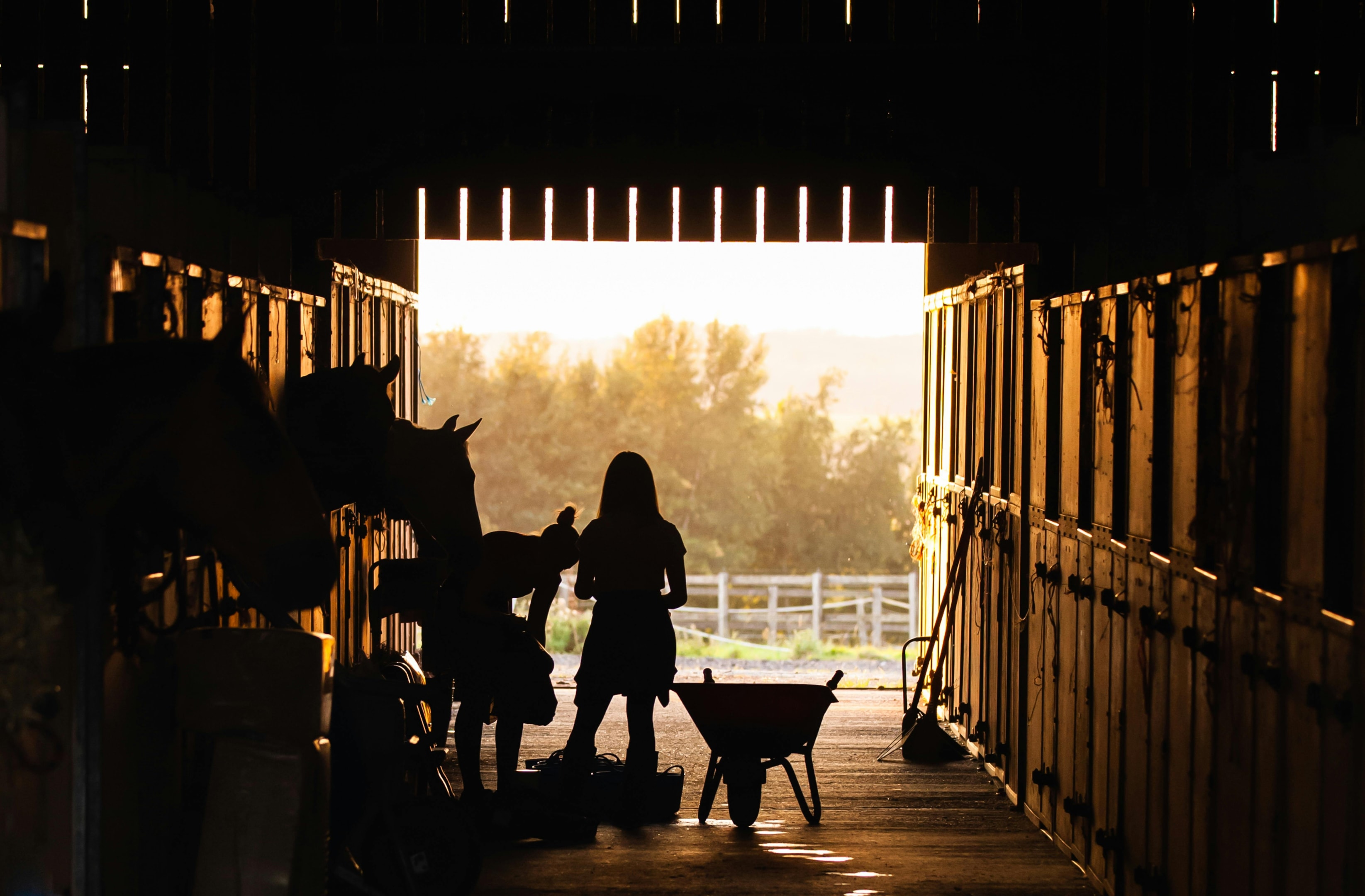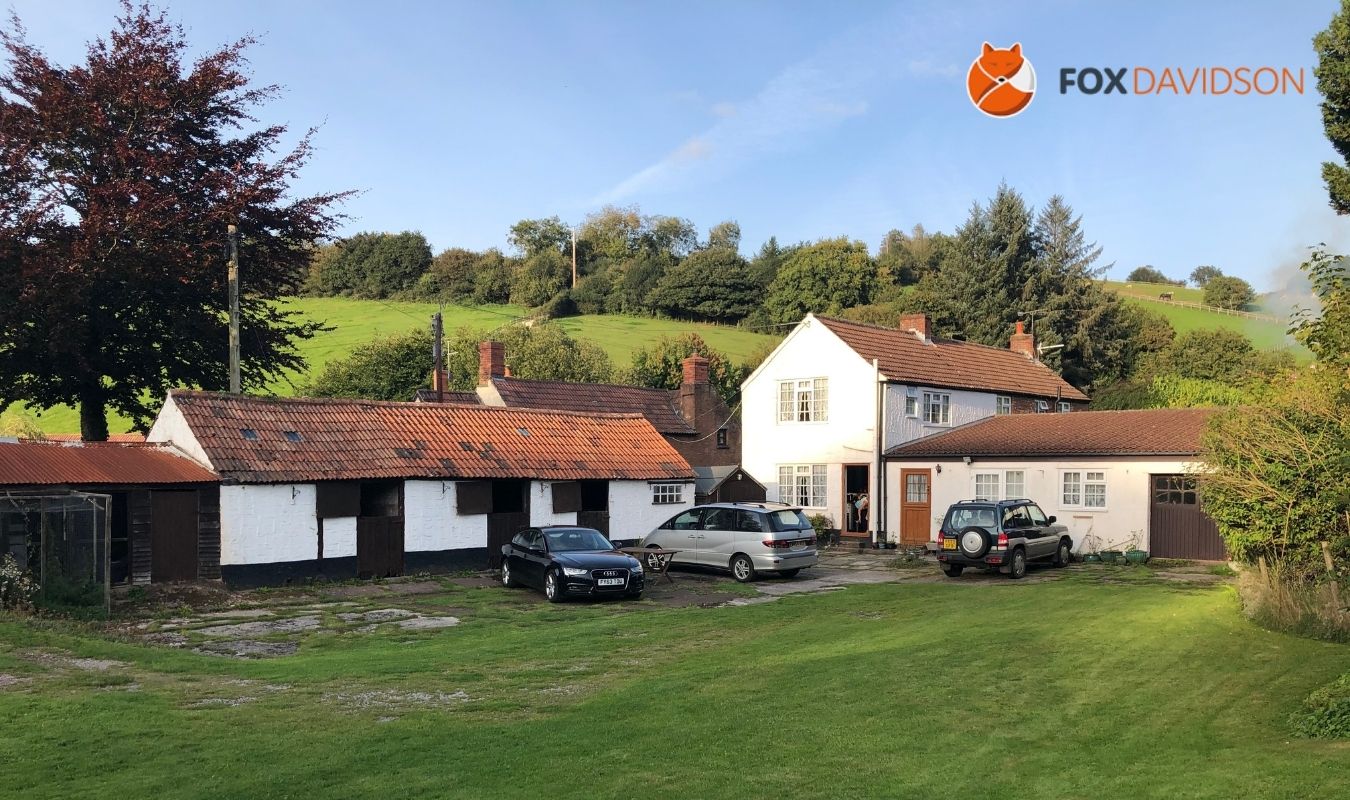Equestrian Property Mortgages – Funding main residence property with equestrian facilities & outbuildings.
updated August 2025
The equestrian property market represents a unique intersection of lifestyle and investment, where a passion for horses meets the practicalities of property finance. Securing a mortgage for property with equestrian facilities requires specialised knowledge, dedicated lenders, and a thorough understanding of rural property markets, setting it apart from standard residential mortgages. Equestrian mortgages are a specialised category of lending products designed specifically for properties with equestrian uses, offering tailored solutions for both residential and commercial needs.
Fox Davidson specifically secure main residence mortgages on country homes with large acreage. The land may contain outbuildings including equestrian facilities. We can not purely secure main residence mortgages using potential income from the commercial use of the equestrian facilities. The loan must be affordable based on your current UK taxable income.

Typical loan-to-value ratios for equestrian property mortgages range from 60-80%, compared to the 90-95% often available for standard homes but using our extensive network of private funding we can achieve 90% loan to value. However, these factors demand careful planning and expert guidance to navigate successfully. This comprehensive guide explores every aspect of securing finance for equestrian properties, including understanding different loan types, how lenders assess these unique properties and working with specialist brokers such as Fox Davidson. We will also discuss the whole term of specialised mortgage solutions available for equestrian properties, ensuring you are well-prepared to secure the right mortgage for your equestrian ambitions. Practical strategies for overcoming common challenges in this niche market are also covered, providing valuable insights for clients seeking advice or solutions for equestrian property finance.
Introduction to the Equestrian Property Market
The equestrian property market in the UK is a vibrant and highly specialised niche, offering a unique blend of lifestyle and investment opportunities for horse owners, enthusiasts, and those seeking to establish or expand equestrian enterprises. Equestrian properties typically combine residential accommodation with purpose-built equestrian facilities—such as stables, arenas, paddocks, and outbuildings—set within substantial acreage of agricultural land. Whether you dream of keeping your own horses at home, running a livery yard, or developing a commercial riding school, the right equestrian property can make those ambitions a reality.
Purchasing an equestrian property is a significant undertaking, requiring careful planning and a clear understanding of the market’s complexities. Properties range from modest smallholdings with basic stabling to expansive estates with professional-grade equine facilities and large acreage suitable for a variety of equestrian activities. Each property presents its own set of challenges and opportunities, from navigating planning permission for new developments to managing the implications of agricultural or equestrian ties that may restrict use or occupancy.
Securing the right finance is a critical step in the process. Equestrian property mortgages differ from standard residential products, often requiring larger deposits and more detailed assessments of property value and income potential. Many lenders in this niche market offer tailored finance options, but working with experienced mortgage brokers is essential to identify the most suitable products and secure competitive rates. For those looking to consolidate existing debt or fund improvements—such as building new stables or upgrading arenas—understanding the full range of finance options is key to long-term success.
When considering a purchase, it’s important to assess not only the quality and suitability of the equestrian facilities but also the amount of land required for your intended use. Factors such as the number of horses, the type of equestrian activities planned, and the potential for commercial use all influence the ideal acreage and layout. Additionally, buyers must be aware of the planning permission process, the impact of agricultural land classification, and any equestrian tied properties or restrictions that could affect future development or resale value.
Throughout this guide, we will explore every aspect of buying and owning equestrian properties—from evaluating property value and working with land agents to arranging mortgages and planning for future growth. Whether you are a seasoned equestrian or new to the world of horse property ownership, our aim is to provide you with the insights, strategies, and expert advice needed to navigate the equestrian property market with confidence and achieve your goals.
Understanding Equestrian Property Mortgages
Equestrian property mortgages differ fundamentally from standard residential mortgages due to the unique characteristics of these specialised properties. Unlike a typical family house, which might sit on a modest quarter-acre plot, equestrian properties often encompass large acreage—frequently requiring a minimum of five acres to qualify for specialist lending products. When considering an equestrian property, it is important to assess how much land is needed for grazing and equestrian use, as this will impact both the suitability of the property and the type of mortgage available. This large land area is essential to support equestrian activities such as grazing, riding, and training.
The complexity of equestrian properties extends beyond land size to include a diverse range of facilities. These typically feature purpose-built stables, indoor and outdoor arenas, paddocks with secure fencing, hay storage buildings, and specialized access roads suitable for horse transportation. Additional equine facilities might include wash areas, tack rooms, feed stores, and quarantine facilities, all of which require specialist valuation expertise to assess accurately.
Most high street lenders approach equestrian properties with caution, viewing them as specialist assets outside their standard lending criteria. This creates a niche market where several appropriate lenders focus specifically on rural and agricultural lending. These specialist institutions understand that equestrian tied properties often combine residential and commercial elements, requiring flexible underwriting approaches that many lenders cannot accommodate.
The commercial potential of equestrian facilities adds another layer of complexity. Properties suitable for livery yard operations, riding schools, or training facilities generate income streams that traditional residential mortgage assessments cannot properly evaluate. In these cases, a commercial mortgage may be required if the property’s primary use is for business or income generation. Lenders must consider seasonal variations in income, the local market for equestrian services, and the borrower’s experience in managing equestrian enterprises, all of which influence mortgage approval.
Types of Mortgages Available for Equestrian Properties
The mortgage market for equestrian properties offers several distinct product categories, each designed to address different property types and usage patterns. Understanding these options helps borrowers identify the most suitable finance options for their specific circumstances. Gaining a clear understanding of these mortgage options is essential to secure funding for equestrian property purchases.
Residential Mortgages for Equestrian Properties
Residential mortgages remain a viable option for equestrian properties primarily used as family homes with personal horse-keeping facilities. These products work best when the equestrian tie represents a lifestyle choice rather than a commercial venture. Lenders typically require that any income from the equestrian facilities remains incidental to the property’s primary residential use.
Standard residential mortgages may be available through mainstream lenders when the property maintains conventional residential characteristics despite having stables or paddocks. However, borrowers should expect enhanced scrutiny regarding agricultural tie restrictions and planning conditions that might affect future marketability. It is essential to confirm that the property’s use aligns with the lender’s criteria for standard residential mortgages.
Commercial Mortgages for Equestrian Enterprises
Commercial mortgages become necessary when equestrian properties operate as businesses. Riding schools, livery yards, training facilities, and breeding operations typically require commercial lending products that can accommodate business income and operational expenses.
These mortgages often feature higher deposit requirements, typically ranging from 25-40%, but offer terms that recognise the income-generating potential of established equestrian enterprises. Lenders evaluate business plans, local market conditions, and the borrower’s track record in managing equestrian enterprises to assess risk and determine lending terms. Note that you must either already run a profitable business with at least 2 years accounts or be purchasing a business that has at least 2 years accounts. We can not fund start-up’s.
All commercial mortgage advice is provided via FD Commercial & Bridging Ltd
Semi-Commercial Mortgages for Mixed-Use Properties
Semi-commercial mortgages address the common scenario where properties combine residential use with commercial equestrian activities. These products recognise that many successful equestrian businesses operate from family homes, generating income while providing residential accommodation.
The challenge lies in balancing residential affordability with commercial income potential. Traditional residential lenders will only assess the borrower’s current personal income rather than the projected business revenue. If the property you are buying has been ran as a trading business and the loan is greater than £1m then we may have more flexible options via our 30+ private bank funders. This hybrid approach suits equestrian tied properties where the equestrian tie involves both lifestyle and business elements.
Specialist Lending Options
The specialised nature of equestrian property finance has created several niche lending products designed to address specific scenarios:
- Interest-only mortgage products subject to lenders criteria. Large loan interest only mortgages are possible to 75% loan to value or 85% if combining capital repayment with interest only (part & part).
- Bridging loans offer rapid funding for competitive property acquisitions, particularly valuable in the fast-moving equestrian property market where desirable properties often attract multiple bidders and require quick decision-making. We can then exit back out on to long term mortgage debt.
Key Requirements for Equestrian Property Mortgages
Securing a mortgage for property with equestrian facilities involves meeting significantly higher requirements than standard residential lending. These enhanced criteria reflect the specialised nature of the properties and the limited pool of suitable lenders willing to finance them.
Deposit requirements typically range from 20-40%, considerably higher than the 5-10% often available for standard residential properties. This reflects lenders’ perception of equestrian properties as higher-risk assets with potentially limited resale markets. Borrowers planning commercial operations should budget for deposits at the higher end of this range to secure competitive rates. Each case is taken on its own merits though and we will assess each property differently.
Working with Specialist Equestrian Mortgage Brokers
The complexity of equestrian property finance makes working with specialist brokers almost essential for successful mortgage applications. These professionals possess intimate knowledge of the limited lender panel willing to finance equestrian properties and understand the unique requirements each lender applies.
Specialist brokers maintain relationships with rural and agricultural lending panels that mainstream brokers rarely access.
The ability to negotiate better rates and terms represents a significant advantage of working with an experienced broker. Experienced brokers understand which lenders offer the most competitive lenders rates for specific property types and can position applications to maximise approval chances while securing favourable conditions.
Complex application processes become manageable with expert guidance. Equestrian mortgage applications typically require extensive documentation, including business plans, facility assessments, market research, and specialised valuations. Brokers coordinate these requirements, ensuring applications are complete and professionally presented.
Ongoing support throughout the purchase process proves invaluable given the extended timescales often involved in equestrian property transactions. Brokers coordinate with specialised surveyors, facilitate communication between parties, and manage the additional complexity of planning permission verification and agricultural tie assessments.
Access to development finance and bridging loan facilities becomes crucial for buyers requiring flexible funding solutions. Specialist brokers can arrange temporary financing for property acquisition while organising long-term mortgages, ensuring buyers can act quickly in competitive markets without compromising their financing arrangements.
Common Challenges and Solutions
The specialised nature of equestrian property finance creates unique challenges that require proactive management and specialist expertise to overcome successfully.
Limited lender appetite represents the most significant challenge facing borrowers seeking mortgages for equestrian properties. The small number of active lenders means that rejected applications severely limit alternatives, making thorough preparation and professional presentation essential for success.
Early market research and pre-application discussions help borrowers understand lender requirements and identify the most suitable products before formal applications.
To discuss equestrian property mortgages with one of our team please do get in touch. We have offices in Bristol & London and cover the whole of the UK.



